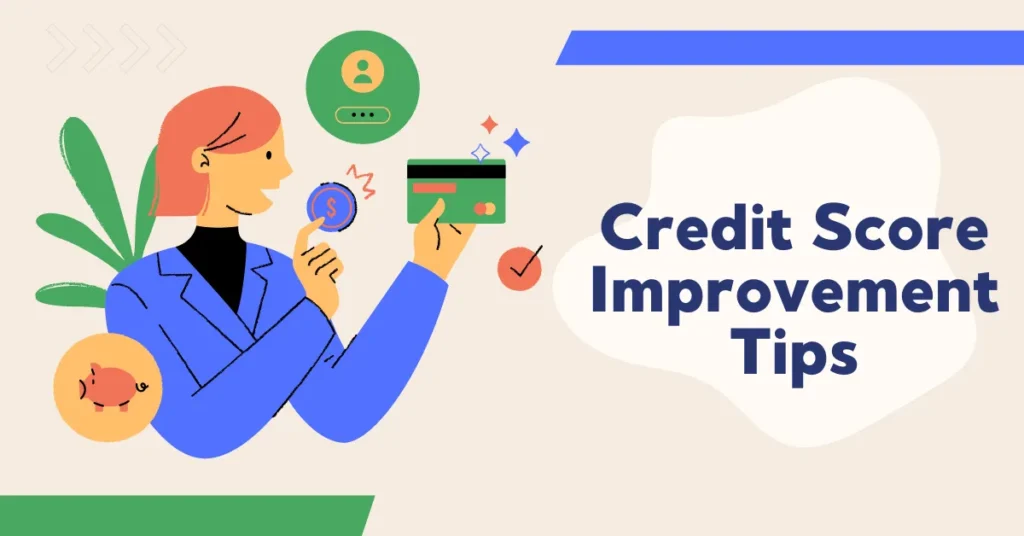Credit Score Improvement Tips: Improving your credit score is essential for better financial health, accessing loans with favourable terms, and securing various forms of credit.
Here are some effective tips to help you boost your credit score:

1. Check Your Credit Report Regularly
Regularly reviewing your credit report helps you identify and correct any inaccuracies or fraudulent activity that could be harming your score.
You can get a free credit report from each of the three major credit bureaus (Equifax, Experian, and TransUnion) once a year at AnnualCreditReport.com.
2. Pay Your Bills on Time
Your payment history makes up 35% of your FICO score. Consistently paying your bills on time is one of the most important steps you can take to improve your credit score.
Set up automatic payments or reminders to avoid missing due dates.
3. Reduce Outstanding Debt
Lowering the amount of debt you owe can improve your credit utilization ratio, which is the amount of credit you’re using relative to your credit limits.
Aim to keep your credit utilization below 30%, and ideally below 10%.
4. Avoid Opening Too Many New Accounts Quickly
Each time you apply for credit, a hard inquiry is made on your report, which can temporarily lower your score. Multiple hard inquiries in a short period can signal to lenders that you are a higher risk. Space out your credit applications to minimize their impact.
5. Don’t Close Unused Credit Cards
While it might seem like closing unused credit cards would be beneficial, it can actually harm your score.
Closing a card can increase your credit utilization ratio by reducing your total available credit. Keep unused cards open, especially if they have no annual fees.
6. Diversify Your Credit Mix
Having a mix of credit types, such as credit cards, mortgages, auto loans, and installment loans, can positively impact your score.
However, don’t take out new loans just for the sake of improving your credit mix.
7. Negotiate for Higher Credit Limits
Ask your current credit card issuers for a higher credit limit.
If your limit is increased and your spending doesn’t increase, your credit utilization ratio will decrease, which can positively impact your score.
8. Use a Secured Credit Card
If you have poor or limited credit history, a secured credit card can help you build or rebuild your credit.
Secured cards require a cash deposit that serves as your credit limit. Make sure the issuer reports to all three major credit bureaus.
9. Become an Authorized User
If a friend or family member with good credit adds you as an authorized user on their credit card, their good payment history can improve your score.
Ensure the primary cardholder pays their bills on time.
10. Settle Delinquencies and Collections
Work with creditors to settle any delinquent accounts and pay off collections.
Some creditors may agree to a “pay-for-delete” arrangement, where they remove negative entries in exchange for payment.
11. Monitor Your Credit Score
Regularly monitoring your credit score can help you track your progress and identify areas for improvement.
Many banks and financial institutions offer free credit score monitoring tools.
12. Dispute Inaccuracies
If you find any errors or inaccuracies on your credit report, dispute them with the credit bureau.
Correcting these mistakes can quickly improve your credit score.
Recommended Reading
- Finance & Insurance HUB
- Car Insurance Comparison Guide
- Best Personal Finance Apps
- Affordable Health Insurance
- Best Health Insurance Plans
- Personal Finance Tips: A Comprehensive Guide
- Small Business Loans
- Health Insurance Marketplace: A Comprehensive Guide
- Student Loan Refinancing
Frequently Asked Questions (FAQs) | Credit Score Improvement Tips
1. How long does it take to improve a credit score?
Improving a credit score can take several months to years, depending on the severity of the issues. Consistent, positive financial behaviour is key.
2. Can I improve my credit score quickly?
While there are no shortcuts, paying off high balances, correcting errors, and becoming an authorized user on a good account can yield quicker results.
3. Does checking my own credit score lower it?
No, checking your own credit score or credit report is considered a soft inquiry and does not affect your credit score.
4. How much will my score improve if I pay off my debt?
The impact varies based on your overall credit profile, but reducing debt can significantly improve your credit utilization ratio and, in turn, your credit score.
5. Is it worth paying for credit repair services?
Many credit repair services offer help in disputing inaccuracies, but they cannot do anything you can’t do yourself for free. It’s often more cost-effective to take steps on your own.
By following these tips and maintaining good financial habits, you can steadily improve your credit score and enhance your financial well-being.
For more detailed strategies and personalized advice, consider visiting reputable financial advice websites like:
NerdWallet
Credit Karma
Experian